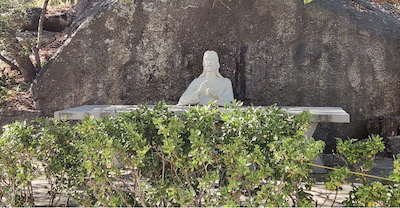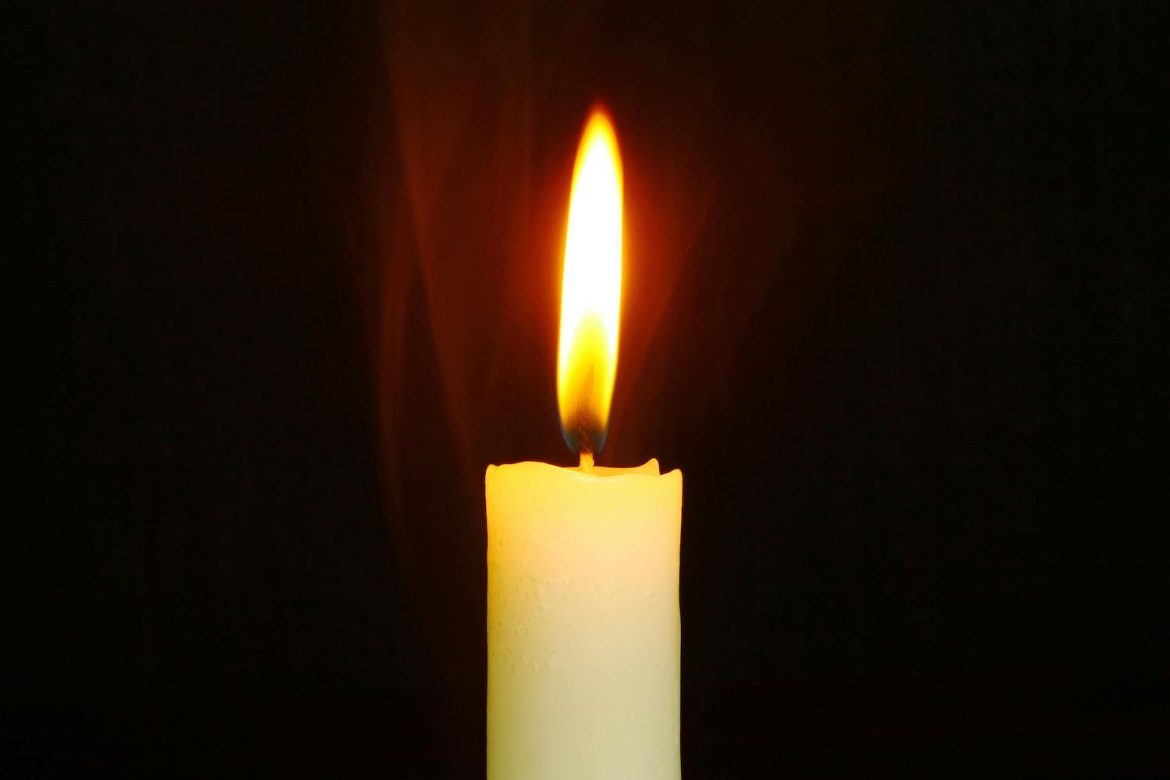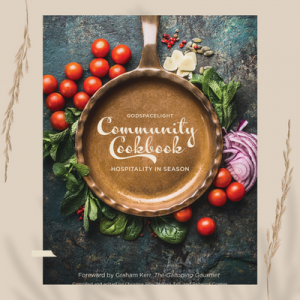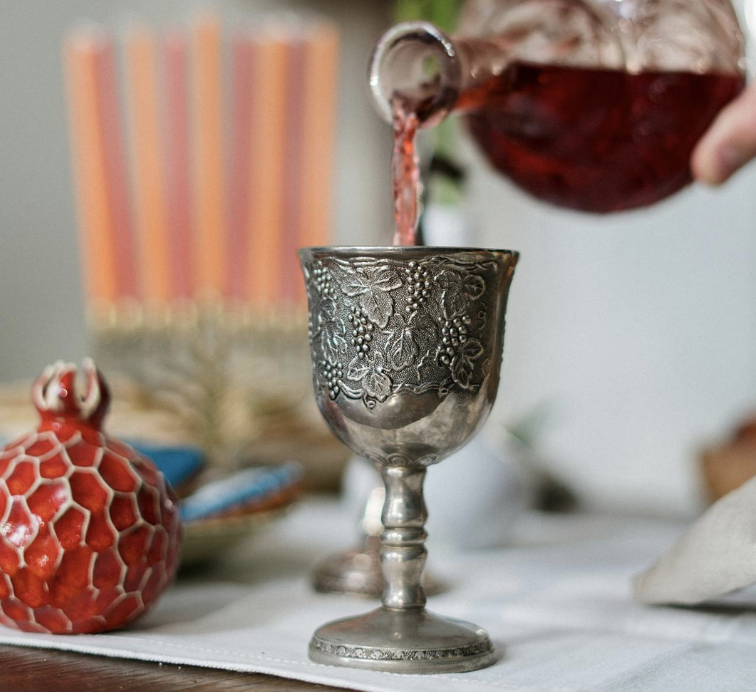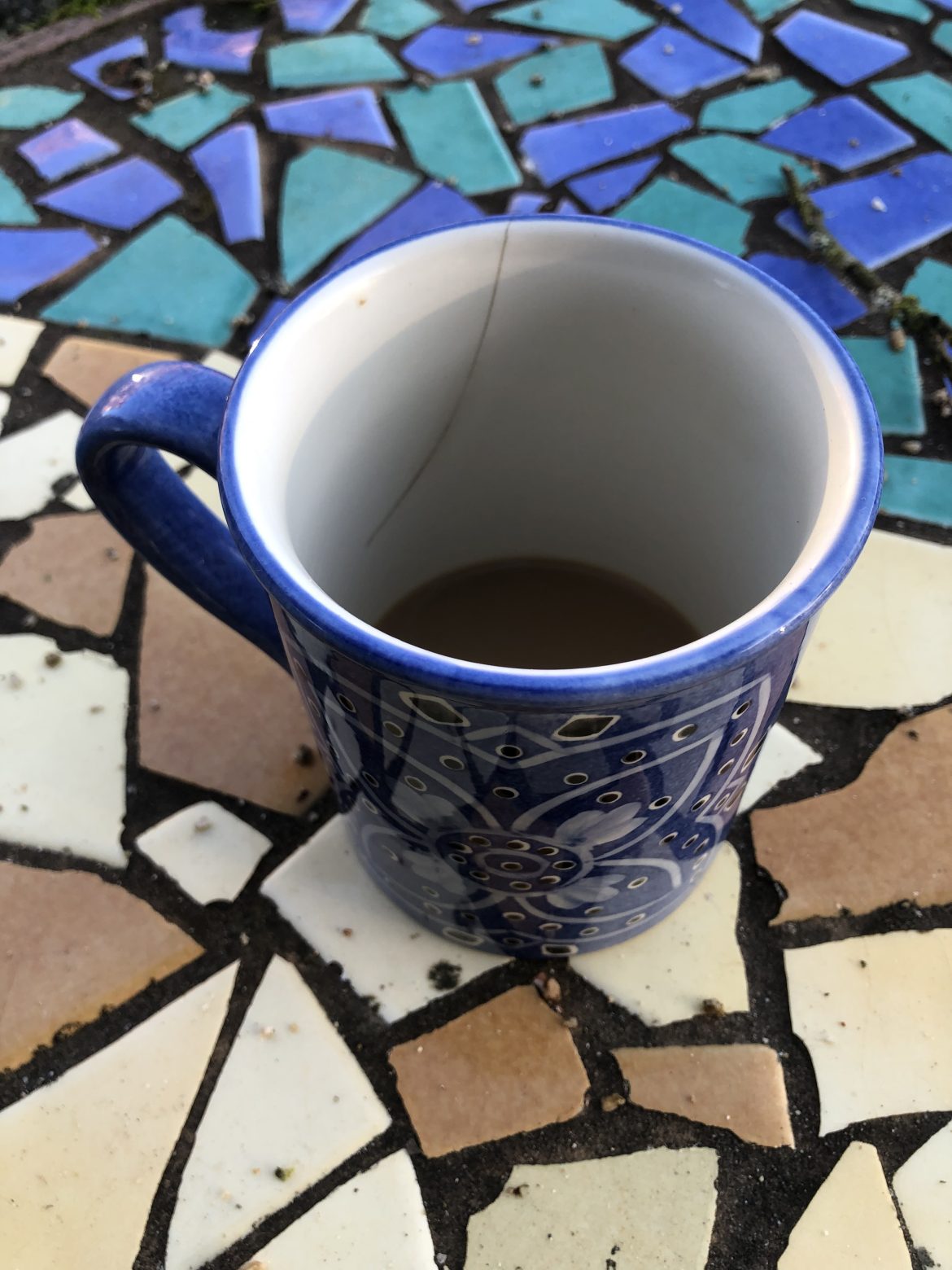by June Friesen
Maundy Thursday is not a term that is used in the Scriptures. I also have to admit that it is not a term that I was familiar with until later in my adult life. As I researched this term and day, I found that it is a term given to the Thursday before Good Friday in England. In many or most other countries it is referred to as Holy Thursday. So where does the word Maundy originate or what is its meaning? Maundy is the term that designates the rite of ‘foot washing’ in the Christian church that is practiced after the example of Jesus washing the feet of His disciples at the Last Supper. This was His final time with them before His arrest, trial and crucifixion. John 13 is where this story was recorded in detail.
John 13 1-2 Just before the Passover Feast, Jesus knew that the time had come to leave this world to go to the Father. Having loved his dear companions, he continued to love them right to the end. It was suppertime. The Devil by now had Judas, son of Simon the Iscariot, firmly in his grip, all set for the betrayal.
3-6 Jesus knew that the Father had put him in complete charge of everything, that he came from God and was on his way back to God. So he got up from the supper table, set aside his robe, and put on an apron. Then he poured water into a basin and began to wash the feet of the disciples, drying them with his apron. When he got to Simon Peter, Peter said, “Master, you wash my feet?”
7 Jesus answered, “You don’t understand now what I’m doing, but it will be clear enough to you later.”
8 Peter persisted, “You’re not going to wash my feet—ever!”
Jesus said, “If I don’t wash you, you can’t be part of what I’m doing.”
9 “Master!” said Peter. “Not only my feet, then. Wash my hands! Wash my head!”
10-12 Jesus said, “If you’ve had a bath in the morning, you only need your feet washed now and you’re clean from head to toe. My concern, you understand, is holiness, not hygiene. So now you’re clean. But not every one of you.” (He knew who was betraying him. That’s why he said, “Not every one of you.”) After he had finished washing their feet, he took his robe, put it back on, and went back to his place at the table.
12-17 Then he said, “Do you understand what I have done to you? You address me as ‘Teacher’ and ‘Master,’ and rightly so. That is what I am. So if I, the Master and Teacher, washed your feet, you must now wash each other’s feet. I’ve laid down a pattern for you. What I’ve done, you do. I’m only pointing out the obvious. A servant is not ranked above his master; an employee doesn’t give orders to the employer. If you understand what I’m telling you, act like it—and live a blessed life.
In the Christian Church, there are some churches that practice foot washing and others that do not. When we look at the history of foot washing in the Biblical times it was not necessarily a ‘religious practice’ but rather was a courteous practice provided by a host/hostess as guests came to their home. This was offered because most everyone either walked in bare feet or with sandals and their feet became very dusty/dirty. No doubt sometimes there were even small cuts or punctures from stickers, stones etc. that were on the pathways. This was usually a task that was provided by the servants of the household rather than the host or hostess. Given this history of foot washing one can understand why Peter, who we recognize as the outspoken one, responded as he did.
Another consideration in this record is that Judas would have been present for the foot washing. How would Judas have felt? Do you think there were any quiet words exchanged between Jesus and Judas? Another couple of questions I have are: did Jesus speak any words to Judas as He washed his feet? How did Judas respond or feel being a part of such an intimate setting knowing what he was going to do in a few hours? I have to admit that meditating upon these verses, trying to put myself in the place of the disciples caused me to seriously consider: how would I have responded or would I respond to Jesus even today if He appeared with a towel and basin of water and sat down at my feet?

JESUS SITTING AT MY FEET
Today Jesus is inviting me to come –
To come and sit in a chair and be with Him –
I look into His face –
I see an invitation of love in His eyes –
I see a smile of peace upon His lips –
I come with hesitant step –
I motion for Him to sit instead
As I have always heard
That I should come and sit at the feet of Jesus.
Yet, Jesus is insistent
And even pats the seat as He once again invites me to sit –
And then I sit – – – –
As I sit I see Jesus then
Reach behind me –
When He comes back in front of me –
He has a towel over His arm
And a basin of water in His hands –
Surely He is going to ask me now to wash His feet.
But no –
What is He doing now?
This cannot be –
He is setting the basin at my feet –
He then sits down at my feet –
And gently, ever so gently He takes my feet –
One foot at a time – – – –
And places them in the basin of water –
My mind, my spirit –
What in the world is happening here – –
And then I feel His Hands gently bathing my feet –
How soothing His Hands are not only to my feet but to my spirit as well –
He looks up into my eyes with tender love and acceptance –
That invite me to relax, let go –
And embrace His gentle love as He prepares my feet
To begin a new walk with Him in the days ahead.
Then He gently takes my feet and places them in the towel,
He gently pats them dry and I hear His voice once again:
“Bless my dear child Father,
On their walk here on this earth,
Guide their feet over the path they will be given to walk,
Help them maneuver through the rough terrain
Of rocks, ruts, puddles, slippery mud, uphill and down –
When they stumble give them a hand to steady their step,
When they fall give them a hand to help them up,
When they are discouraged and don’t know which way to turn
Call in Your own gentle way, Father
Directing them to where You are taking them –
Thank You Father for this precious child –
Thank You for watching over them all the way
Until You and I have their home ready for eternity –
And then help them to take that last step
When I can reach out and say –
‘Welcome home my child – your eternal home is ready now
Where you can live forever with my Father and I.
Signed, Jesus
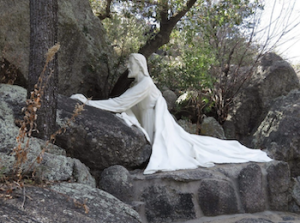
Photos by June Friesen. Scripture is from The Message translation.
May You who establish peace in the heavens, grant peace to us….
From Mourner’s Kaddish
Jesus said to her, “I am the resurrection and the life.
John 11:25
Just an old, sweet song, keeps Georgia on my mind
Stuart Gorrell/ Hoagy Carmichael
My mother, Georgia S. Borror died on March 8th, 2023. For the last year, when I have attended the Friday night Shabbat service at my wife’s synagogue, we stood and prayed the Mourner’s Kaddish with others who have lost loved ones. Having access to this practice for the first time in my life has been meaningful in ways I cannot fully articulate. Mom’s service was the week after Easter, and I do believe in the hope of the Resurrection. But life is lived on this side of the Cross. Being able to publicly acknowledge my loss by standing and praying has been a kind of yearlong acknowledgment of mortality and “from dust you came…”
It has also been a time of recalibrating my relationship with Mom. Attending to the well-being of my mother after my father’s death was a constant calculus of figuring out what was best for her, what was needed, what was realistic. Even when you were doing what was best, it never felt good or enough. Since her death, there have certainly been moments of sadness wishing she could have met her latest great grandsons or being sorry she never got to visit us in Vermont, which she would have loved. But for the most part “Georgia on my mind” now is marked by gratitude and appreciation for being fortunate enough to have been loved so well by such a strong and spirited woman.
The paradoxes of grief and love, of death and hope that are the marks of both life and the season of Lent, are poignantly portrayed in John 11. We are told that Jesus loves Martha, Mary, and Lazarus (11:5). In the midst of bearing the brunt of Martha’s sorrow, anger and disappointment, Jesus promises himself as the guarantee and comfort of the Resurrection (11:25). But even though there will be a miracle, Jesus also grieves with the broken hearted (11:35).
I recently read a post by the lyricist Lenora Rand, who, evoking Bob Dylan stated, “Why Practice Lent? Because Everything Is Broken.” That is why grief and Lent make for congruous companions. But so are hope and resurrection fitting traveling partners. And somehow being on the road with Jesus holds them all together.
What do you need this Lenten Season? What are you longing for as you look towards Easter? How can we create Beauty from the Ashes of the past two years?
Join Christine Sine and Lilly Lewin in this virtual retreat as they guide you to lay down grief and gather joys through the journey of Lent. This online course was adapted from a live virtual retreat.
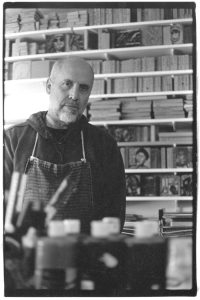
In this conversation, Christine Sine interviews artist Kreg Yingst about his journey as a block print artist and his approach to combining art and faith. Kreg shares how he got into block prints and the influence of storytelling art on his work. He discusses his connection with the Psalms and parables, and how his art became a spiritual practice. Kreg also talks about the impact of his artwork on people, sharing stories of healing and restoration. He emphasizes the importance of embracing creativity and finding a place in the body of Christ.
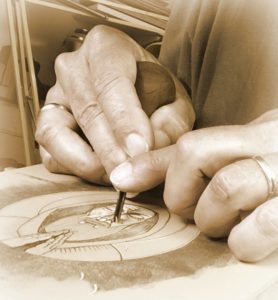
Takeaways
- Block printing is a time-consuming method of printmaking that allows for storytelling and narrative art.
- Art can be a spiritual practice and a way to connect with God.
- Artwork can have a profound impact on people, bringing healing, restoration, and spiritual growth.
- Creativity is a unique expression of faith and should be embraced and celebrated.
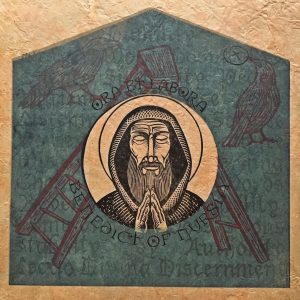
Stay Connected
For more information about Kreg Yingst and to learn about his upcoming book release for Everything Could Be A Prayer, https://amzn.to/48UqKs2 visit his website Kregyingst.com or his Etsy shop www.etsy.com/shop/psalmprayers or follow him on instagram, www.instagram.com/psalmprayers; www.facebook.com/psalmblockprints
For more information about the Liturgical Rebels host, Christine Sine visit her website godspacelight.com or follow @christinesine on Instagram, Facebook X our Youtube.
So, today is Palm Sunday, the start of Holy Week. I wonder what you will be thinking of? The palm crosses, which will become the ash for next Ash Wednesday? The air of celebration, or a sense of foreboding for that is to come? Joyous processions you have seen, perhaps with excited children?
It may surprise you, but on Palm Sunday I always have four processions in mind, each of which have different things to say. The first is the procession of the Ark into Jerusalem in 2 Samuel 6. The Ark was the tangible symbol of the presence of God, and as it is brought into the city after a long absence, David worships, dancing with jubilant celebration. When he returns home though, his wife Michal, who has watched from a window, cut off from the celebration, is appalled. She was the daughter of Saul, a royal princess, so perhaps she is concerned for his dignity as king. Certainly, her life had been tragic – passed around like a pawn from person to person even though she loved David and had saved his life. This sad story reminds me that at times, in our heartbreak or our lack of understanding, it can be hard for us to join in celebratory worship. Perhaps that will be your experience today. If so, my prayer is that you will know that God understands.
The second procession brings us back to the events we celebrate today, but not yet to Jesus on a donkey. We know from historians that two parades took place that day. Passover was a huge event, and so under the oppression of Roman rule, it was always a risky time, where rebellions could be easily sparked. So on the first day of Passover Pilate paraded into Jerusalem, entering the west gate – the front gate – riding a war horse and with legions of chariots, horses, and foot soldiers, dressed for battle and armed with swords and spears. The message was clear. Don’t even think of coming up against the might of Rome. Our world is still dominated by the power of force and we will be very aware of places where conflict continues to rage this season.
It is therefore highly significant and in stark contrast that at the same time, Jesus enters Jerusalem from the other side, the east, on a donkey. Kings rode horses at war, donkeys in times of peace. In addition, Jesus, who had always travelled on foot, was quite deliberately fulfilling the prophecy of Zechariah 9:9. It is a clear statement: I am your true king, and of a very different kind. When rebuked by the Pharisees (perhaps fearful of the Roman response) for the raucous nature of what was happening, Jesus replies simply that if others are quiet, the very stones would cry out. (Luke 19:40) In an echo of the first procession, the bodily presence of God, the one who created everything, is brought to Jerusalem, on the day that the lambs were chosen for sacrifice. It is an event of profound significance.
Which brings me to the fourth procession. Just five days later, Jesus will again walk the streets of Jerusalem, this time not being carried, but staggering under the weight of a cross, looking defeated, sad and worn – so very different from the celebration such a short time before.
And yet Hebrews 12:2 tells us that Jesus ‘for the joy that was set before him he endured the cross, scorning its shame, and sat down at the right hand of the throne of God.’ What was the joy set before him? Returning to the full presence of the Father and Spirit, his task complete? No doubt, but I think there was more. I think we were the joy set before him. The prospect of bringing us wayward children home. You, and I, kept hm walking that day as the crowds jeered and wept.
So this Palm Sunday, perhaps take a moment to remember all four of those processions, but most of all, breathe a quiet thank you.
The Godspacelight Community Cookbook is unquestionably a community cookbook with recipes created by readers, authors, and friends of Godspacelight. Our community spans the world, so we asked for recipes that reveal the different cultures and traditions we come from. Contributors from the U.S., Canada, Australia, the U.K., Norway, Malta and South Africa provided not only recipes but also lots of fun stories and anecdotes to go with their recipes. These stories are inspiring to read as they give us insights both into the contributors’ lives and their cultures. And the recipes themselves are delicious to make.
It’s Holy Week, themes written about week of Jesus’ life. John’s gospel dedicates 9 chapters to its events, Matthew 6, and people have been writing about it ever since. As I mentioned in my Meditation Monday: Walking with Friends Through Holy Week I love to look at Holy Week from different perspectives. It helps keep Jesus’ journey towards the cross fresh and compelling. It encourages me to consider new aspects of the journey and explore new facets of Jesus’ life and ministry. I have written about The Subversive Walk of Holy Week and the Garden Walk of Holy Week, two posts I love to revisit each year. This year however, still filled with the glow of celebrating a good friend’s 80th birthday a week ago, I am pondering the close community of friends who walked with Jesus through his final days. There are quite a few of them yet we rarely think about how much Jesus valued their support, even when they fell asleep, ran away or doubted him.
Yesterday I read another very compelling view of Holy Week. Scott Erickson, who I interviewed for the last Liturgical Rebels episode, collaborated with Nadia Bolz Weber, to consider the last words of Jesus’ life. Scott created a Cross with images of each word which Nadia took to the prison where she works as chaplain and asked the inmates to write comments. Talk about compelling. It provided a new and very important perspective on these last words Jesus spoke.
As you walk through Holy Week I encourage you too to think about aspects of Jesus life you have not considered before. It seems to me that for many people Holy Week ends on Good Friday but that is not what we should dwell on. When we plant a seed, we don’t mourn and wail, we wait in joyful anticipation for the new life to emerge. Death is necessary for life to flourish. It nurtures fresh and vibrant life. As we walk through Holy Week, I wonder what our eyes are focused on? What are we willing to put to death so that life can flourish in, around and through us. How willing are we to accept the cost of Easter and look beyond the pain and suffering as Christ did so that life can flourish?
In her Freerange Friday – Begin Holy Week With Our Cup, Lilly Lewin used one of my favourite analogies – a cup – to reflect on as we enter Holy Week. “Pick out a cup to pray with today. Consider what the cup of your life is like. Hold your cup and consider what’s been filling your cup this week.” Don’t forget to visit her website and download Praying With Your Cup For Holy Week.
On Thursday June Friesen in Let Go Let God, discussed not only our need to let go, but God’s too. I appreciated the ways she talked about the times God let go throughout history beginning with Adam and Eve and ending with Jesus.
Dianne Woodrow’s Clean Monday is also worth reflecting on. As she says: Aren’t we good at finding plausible excuses? Yet the Bible has much to say about not putting off to tomorrow what you can do today. I thought there were only one or two but Open Bible has collected 46!!! Forty six bible verses that pertain to doing things when you say you’ll do them and not putting them off! Oh My Goodness!!!! That has certainly surprised me.
Tomorrow we will publish the 4th episode of The Liturgical Rebels podcast, a delightful interview with artist Kreg Yingst about his journey as a block print artist and his approach to combining art and faith. It was fascinating to chat to him and I think you will really enjoy this. Don’t forget to subscribe to The Liturgical Rebels wherever you listen to podcasts, so that you can hear each episode as it is published. Make sure you listen to the first 3 episodes before listening to this one.
We are still having issues with the godspacelight website. Our apologies for the broken links which make our resource lists more difficult to access. This week, I am moving much of my activity to Substack. We will continue to post on the Godspacelight blog, but less frequently. We will also maintain the resource lists. There are several reasons for this. First security changes make posting and sharing to social media more difficult than it used to be. Second, it is harder than it used to be for people who access posts through social media to find them. It is increasingly frustrating to share and then have people tell me they have not seen articles. Third, I have people constantly share my prayers, poems and articles without acknowledging me as the author. I know that my inspiration comes from God, which is why I like to share freely, but I do like to be recognized. Fourth, it is becoming more expensive to run the blog because all these necessary changes cost money. I contribute $10,000 to $20,000/ year to run Godspacelight with little compensation. On Substack there is opportunity for you to support my ministry if you use it regularly and benefit from it.
These broken links are the ones for posts within Godspacelight. Links for other sites still work. If you want to access Godspacelight posts use the search option. Usually if a Godspacelink is broken you can just put the title into search and get to the page.
Here are some links to our resource list
Maundy Thursday
Good Friday
Holy Week With Kids
Stations of the Cross
Easter Sunday
Many blessings on you as you walk through Holy Week. Here is a prayer that Carol Dixon wrote in response to my Meditation Monday.
Walking through Holy Week
This year
I walk through Holy Week
With friends who are grieving
The loss of a loved one…
Jesus is with us.
I walk through Holy Week
With friends who are ill or infirm
And cannot walk…
Jesus is with us.
I walk through Holy Week
With friends who are too busy
To even notice
Jesus is with us.
I walk through Holy Week
With friends who struggle
To deal with the world’s problems…
Jesus is with us.
This year
I walk through Holy Week..
With Jesus.
(c) Carol Dixon
Christine Sine
 On May 11 from 10 am to 12 pm PT (check my timezone) We will discuss connections between community, spirituality and gardening. Explore the wonderful ways that God and God’s story are revealed through the rhythms of planting, growing and harvesting as well as the beauty of nature. This webinar is for anyone who admires the beauty of God’s good creation, likes to walk in nature, sit by the ocean or just relax and listen to the birds in the trees. It is based on Christine Sine’s popular book, To Garden with God and each participant will receive a digital copy of this book.
On May 11 from 10 am to 12 pm PT (check my timezone) We will discuss connections between community, spirituality and gardening. Explore the wonderful ways that God and God’s story are revealed through the rhythms of planting, growing and harvesting as well as the beauty of nature. This webinar is for anyone who admires the beauty of God’s good creation, likes to walk in nature, sit by the ocean or just relax and listen to the birds in the trees. It is based on Christine Sine’s popular book, To Garden with God and each participant will receive a digital copy of this book.
by Christine Sine
I love to look at Holy Week from different perspectives. I have written about The Subversive Walk of Holy Week and the Garden Walk of Holy Week, two posts I love to revisit each year. This year however, still filled with the glow of celebrating my friend’s 80th birthday a week ago, I am pondering the close community of friends who walked with Jesus through his final days. There are quite a few of them, yet we tend to gloss over their importance as support and comfort for Jesus.
First there are Mary Martha and Lazarus. John 12:1 tells us that 6 days before Passover they hosted a dinner for Jesus and other good friends for the last time. Mary lavishly anoints his feet with expensive perfume, probably in gratitude for the restoration of her brother Lazarus but also in some ways foreshadowing what Jesus does in the foot-washing at the last supper. Good friends do that. They lavish expensive gifts on us as an expression of their love. They do what they can, often more than we think they can afford, to help relieve our aches and pains (I suspect Jesus feet were sore after so much walking) I don’t know if she sensed she was preparing him for burial, but good friends often do unexpected things that prepare us for the future in ways that make us very aware thatchy are guided by the holy spirit.
Then we see Jesus process into Jerusalem surrounded by his disciples, many of whom are his best friends. They walked with him not only in this procession, but throughout the events of Holy Week even though they didn’t understand what he was doing. I think back on the friends who have stood by me through challenging times and through times I made decisions they did not understand or agree with. How precious friends who accept us even when they don’t understand us are. Jesus friends had lots to puzzle over during those last few days of his life. Judas left but the rest continued to walk with him, not just followers, but more like family. I wonder if Jesus would have been able to face what he knew lay ahead in Jerusalem without those good friends walking beside him.
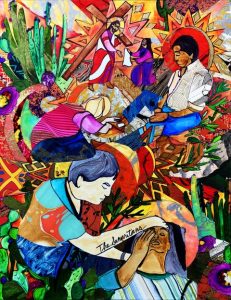
Artwork by Mary Button https://www.marybutton.com/#/border/
Next comes the Last Supper, foot washing, sharing bread and wine, expressing the need to love one another as Jesus loved them (John 13: 34) . I think as we read this we gloss over Jesus love for his disciples not as disciples but as friends. In John 15: 13- 15 we read one of the most beautiful descriptions of friendship in the Bible.
“No one has greater love than to give up one’s life for one’s friend. You are my friends if you do what I command you. I don’t call you servants any longer, because servants don’t know what their master is doing. Instead, I call you friends, because everything I heard from my Father I have made known to you.
“I call you friends” What an incredible statement for the son of God to make. Sit and bask in the wonder of it for a while. I think this is whole evening is one that only flows out of the love of deep friendship, the love one only holds for those who have walked through thick and thin with us, even those we suspect are about to betray us or deny us, or run away. I think that deep down Jesus knows his friends will eventually overcome their fears and be there at the end and in the new beginning.
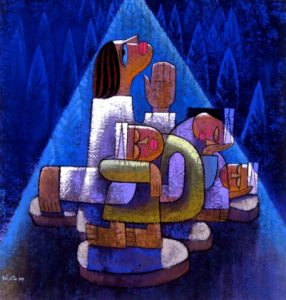
Praying At Gethsemane – He Qi
Then we see Jesus in the garden of Gethsemane with his friends. Unfortunately they fall asleep, and it is obvious that he is grieved by their inattention. He must have felt very alone at that point. When we hope that friends will enter into our struggles and they they fall asleep instead, it can be very hard. for us too. Recognizing that Jesus suffered in this way too was very helpful for me.
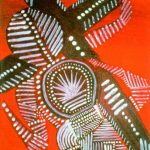
Australian Aboriginal Crucifixion – artist unknown
Next we come to the crucifixion where the women are most prominent at the foot of the cross. (John 19: 25,-27 Women like Mary Magdalene – one of his closest friends. She is one of the last with him when he died. A witness to the horrors of his death, but also the first to see him after his resurrection. Hers was the first name he uttered in the garden. Surely this speaks of deep friendship and love. There is also his good friend John to whom he commends his mother’s care. Such an incredible moment and it reminds me of friends dying of cancer and other painful diseases who commend their loved ones to friends. How good it is, even for Jesus, to know that they have friends who will take on the responsibility of family. Friends like this can be closer than biological brothers and sisters.
Here on the cross Jesu also seems to make a new friend. In the agony of torture, in the horrors of crucifixion, one of the criminals being crucified with him turns to him and asks to remembered “when he comes into his kingdom (Luke 23:40-42/ As I read this over the weekend I felt the strange intimacy of the moment. It seemed that this man was saying “Be my friend as I die, take me with you into your kingdom.”
I love that Jesus last appearance recorded in John’s gospel is like a great reunion of close friends. In the middle there is breakfast on the beach because all good friendships are cemented by food and fellowship. Here we meet once more Peter who needs to feel Jesus’ forgivenness. Friends like John who describes himself as “the disciple whom Jesus loved.” (John 21:20) The exchanges of this last encounter are intimate, emotional, and indicative of deep friendship, friendships that formed the foundations out of which the Way of Jesus could become a reality and spread throughout the world.
Where would we be without friendship? Sit quietly and picture your closest friends. How have they shaped your life? How have they encouraged you through the good times and the bad? Take some time to journal about them.
Now consider Jesus as your friend. Do you realize that he does not just call his disciples friends but calls you friend too? Sit and imagine yourself walking in the company of Jesus. How does this friendship impact your life?
The Ending of Lent…
The Beginning of Holy Week…
Pick out a cup to pray with today. Consider what the cup of your life is like.
Hold your cup and consider what’s been filling your cup this week.
My cup has been filled with a lot of frustration lately. Allergy season hit hard and shut down my productivity and declutter plans this week which filled my cup with discouragement.
I’ve had a pretty pathetic lent…I started out strong and focused and lost it somewhere in week four. I think the stuff of the world got my focus rather than the stuff of God. The Wilderness of war and rumors of war invaded my peace and distracted me from being present in the wilderness with Jesus. I’d like a do over please!
We thankfully all get a do over this week…it’s Holy Week starting on Sunday. I’m starting early with today.
Once upon a time, Lent was only Holy Week, not the forty days, so we get to begin again and focus our attention on the last week of life on earth of Jesus.
Jesus had warned his disciples that this week was coming. I don’t think any of them were really ready, or actually understood.
Like us, they were all hoping for a different outcome. They were all still imagining a world at peace without the Roman occupation…they all wanted Jesus to deliver them from their oppression and for Jesus to be their conqueror.
That truly is what I want .. I want Jesus to come in and rescue us from all the oppression in our world. I want Jesus to come and end the senseless wars and killing of children. I want Jesus to bring peace and restoration and end gun violence in our neighborhoods and cities. I want Jesus to wipe out racism and injustice and bring his love and mercy into hearts, especially the hearts of my enemies!
I see why the disciples didn’t really get what was about to happen.
How are you feeling as the Lenten season is ending? Is your cup feeling full of misunderstanding, or perhaps it’s full of anger, frustration, hurt or rather empty due to the stuff of life? Talk to Jesus about where you are today.
Even when our cups are feeling broken and cracked there are good things we can take time to notice and thankful for like the beautiful trees this spring or the surprise of free tickets to a concert that I received this week. Celebrating our son’s birthday with him and listening to great jazz and remembering birthday past all brought joy into my cup!
What are the good things in your cup right now? Drink them in and be grateful.
So as we end Lent let’s keep an open cup handy as a reminder….
A cup open to receive from Jesus in the days ahead.
Let’s drink
A cup of God’s presence.
A cup of stillness
A cup of peace
Let’s hold a cup of grace for one another as we see family and friends.
Let’s hold a cup of love and grace for ourselves too.
Consider all the cups of Holy Week…Jesus took the cup of wine at the table at the last supper and gave us the new covenant. And the cup in the garden…What is the cup Jesus is inviting you to hold and drink from this week?
I invite you to pray through Holy Week with your cup. You can download s hand out for free freerangeworship.com
As an Amazon Associate, I receive a small amount for purchases made through appropriate links.
Thank you for supporting Godspace in this way.
When referencing or quoting Godspace Light, please be sure to include the Author (Christine Sine unless otherwise noted), the Title of the article or resource, the Source link where appropriate, and ©Godspacelight.com. Thank you!

